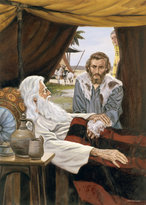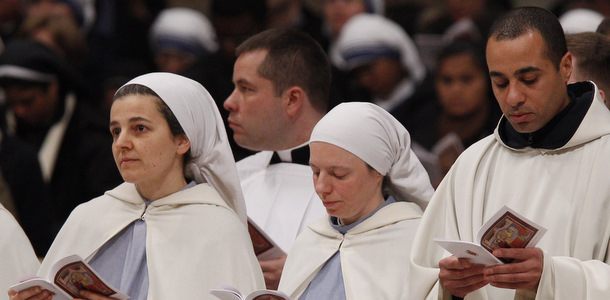 |
| Candlemass Offertory |
Placing the commentaries of Hilary (315-367) and Ambrose (339-397) in columns impress on us the patristic biblical styles succeeding in 30 years, 367-397.
MONDAY, FOURTH WEEK OF ORDINARY TIME, YEAR II
A READING FROM THE BOOK OF
GENESIS
(Esau
is supplanted: Genesis 27:30-450
.v. 40 “By your sword you shall live, And your brother you shall serve; But it shall come about when you become restless, That you will break his yoke from your neck.”
Monday of the Fourth Week in Ordinary Time Year 2
A READING FROM ON JACOB AND THE BLESSED LIFE BY ST
AMBROSE
|
Saint
Ambrose
|
Saint
Hilary of Poitiers
|
|
A
READING St Ambrose, On Jacob and the Blessed Life,
3.10-12; FoC 65 (1971) tr. McHugh
On Jacob
and the Blessed Life
After
Isaac had finished blessing Jacob, the elder brother arrived. By this it is
revealed that the Kingdom was predestined to be bestowed on the Church rather
than on the synagogue, but had secretly entered the synagogue so that sin
might abound and, when sin had abounded, that grace might also abound. At the same time, it makes it clear
that the candidate for the kingdom of heaven must be quick to carry off the
blessing for which he has been recommended. On this account the younger son
was not blamed by his father but praised, for Isaac says, Your brother came deceitfully and
received your blessing. For deceit is good when the plunder is without
reproach. Now the plunder of piety is without reproach, because from the days of John the kingdom
of heaven suffers violence and the violent bear it away. Our fathers
celebrated the Pasch in haste and ate the Lamb in haste with no delay, and
the holy Joseph summoned
his brother Benjamin by a holy fabrication and deceit.
Nevertheless,
Esau brought it about by his demands and entreaties that he did receive a
blessing, but such a blessing as was in agreement with the earlier one,
namely that he should serve his brother. Indeed, the one who could not
command the other ought to have served him, in order to be ruled by the one
who was more wise. It was not the role of the holy Patriarch to deliver his own son to the ignoble state of slavery.
But since he had two sons, one without moderation and the other moderate and
wise, in order to take care for both like a good father, he placed the
moderate son over the son without moderation, and he ordered the foolish one
to obey the one who was wise. For the foolish man cannot of his own accord be
a disciple of virtue or persevere in his intent, because the fool changes
like the moon. Isaac was right to deny Esau freedom to make his own choices; else he might drift like a
ship in the waves without a helmsman. But
Isaac made him subject to his brother according to that which is written, The unwise man is the slave of
the wise man. Therefore the Patriarch was right to make him subject, so
that he might amend his dispositions under rule and guidance. And so Isaac
says, By your sword shall
you live; you shall serve your brother, for holiness has mastery over
cruelty and kindness excels over emotions that are harsh.
Every
man who does not possess the authority conferred by a clear conscience is a
slave; whoever is ensnared by pleasure or seduced by desires or provoked by
wrath or felled by grief is a slave. In fact, every passion is servile,
because everyone who commits
sin is a slave of sin, and, what is worse, he is the slave of many sins.
The man who is subject to vices has sold himself to many masters, so that he
is scarcely permitted to go out of servitude. But the man who is the master
over his own will, judge over his counsels, and who restrains the longing of
his bodily passions, is assuredly a free man. For the man who does all things
wisely and in complete accord with his will is the only truly free man.
|
Second Reading
From the writings of
Saint Hilary of Poitiers (Tract. Mysteriorum 25-26: se 19bis, 116-120)
The door of salvation is open to all
In the Bible everything is carefully recounted and written down
to enable us to perceive the superabundant mercy of God in the present prefiguration
of what will take place in the future, for the same narrative of events applies
both to the here and now and to what is hoped for in time to come.
When about to bless Jacob in place of Esau, Isaac was anxious not
to be deceived in any way. This shows his love for Esau, Nevertheless, when a
little later Esau returned from his hunting and presented himself to his father
as his first-born to receive his blessing, Isaac showed no emotion on discovering
that Jacob had stolen his blessing but rather confirmed the blessing he had given
him.
Why did he change his mind? Why were his feelings inconsistent?
Surely it must be because the words of scripture refer both to historical events
and to those to which we look forward in hope. The concern Isaac showed by the
questions he put to Jacob was prompted by his paternal affection; his refusal
to revoke the blessing stemmed from spiritual insight. In the former he followed
natural impulse, in the latter he held to providentially ordained symbolism. In
the former the father was concerned to sanctify his first-born, in the latter,
moved by the spirit of prophecy, he confirmed the blessing of the new people.
The narrative recounts historical events, but at the same time points to the hope
they prefigure.
Yet this is not the end of the prophecy, for the people of old
could still aspire to a share in the blessing bestowed on the new people if only
they would believe. The door of salvation is open to all, and the way of life
is hard not because it is difficult in itself, which it is not, but because of
our own will. That it is the human will which delays the reception of divine
mercy is shown by the words addressed to Esau, He had asked for a blessing,
but his father, moved by the Spirit, delayed the effects of the blessing he asked
for until he had thrown off the yoke of his brother, who was to be his master.
He was at liberty, then, to throw off the yoke, since it is the power of each
of us, by an act of the will, to accept the faith.
When we have passed from the servitude of disbelief to the freedom
of faith we shall deserve the blessing.
|











+15+Dec.jpg)



